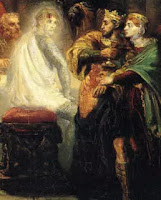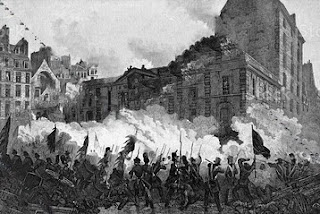-: Importance of Banquet Scene in the play and its impact on the characters and the audiences :-
 |
| William Shakespeare (bapt. 26 April 1564 – 23 April 1616) |
The application of Banquo's corpse in the banquet scene is ghastly with the fixed, glaring eyes and ("twenty trenched gashes" or) "twenty mortal murder" on its "crown", nodding its "gory locks" in insistent, dumb accusation. Although it has been regarded as mere hallucination, like the air-drawn dagger, it was clearly more than a projection of guilt. Curry thinks, "Banquo's ghost is an infernal illusion created out of the air by demonic forces and presented to Macbeth's sight at the banquet in order that the murderer may be confused and utterly confounded". It is a kind of analogy for Macbeth's mutilated soul. The inner dialectical struggle of Macbeth with himself is projected on the supernatural plane in this scene.
In this scene Macbeth observes, Banquo's ghost is solid enough to take up space at the table. Yet only Macbeth can see it, and, therefore, his horror and fury seem bizarre to the company of thanes in the banquet hall. It causes much inconvenience for contemporary productions to stage this apparition, at once solidly material and phantasmal. As Neil Forsyth observes, modern stages typically handle this and other Supernatural events in Macbeth — taking them either as "real" or disturbed supernatural events, external to the character; or imaginary psychological ones, encouraged from Macbeth's subconscious, guilty conscience or disturbing emotions. In performance, the cues that Banquo's physical body is onstage, although only Macbeth witnesses it, still sustain a sense of dissonance and even crisis in our modern sensibilities. However, the whole effect is aborted if, as so often nowadays, no physical ghost appears on the stage.
 |
| Ellen Terry as Lady Macbeth |
One of the most effective theatrical points in the whole play occurs in the banquet because the downward spiral of Macbeth's fortune picks up the pace here. The coda of the scene shows us the King and Queen, now abandoned, slumped in their finery amid the relics of the "great feast" giving eloquent visual expression to the meaning of their fates while guilt, horror and relentless resolution pass before their mind. Lady Macbeth, exhausted by the terrible events just passed and by the effort to cover up for her husband, never really re-establishes herself again. Macbeth has recovered his poise, and the Ghost has vanished; but the recovery has been in terms that establish his psychological power over himself only at the expense of his social ruin — that he has displaced the mirth, broke the good meeting". The disruption of the banquet means that his new regime does not get ratified by the assembled nobility of Scotland. The involuntary self-disclosure that he has made makes his integration with the royal society impossible and he resolves on crime and further crime to achieve security and decides to visit the “weïrd sisters” (the witches) to know his future; he climbs out of his abyss by planning new exploits, by action which needs no pondering:
| Strange thing I have in head, that will to hand;
Which must be acted ere they may be scanned.
(Act -3, Scene - 4, line- 138-139)
In "Macbeth: King James' Play" George Williams notes that the ghost of Banquo holds sway in the drama's central scene, thus inflating the compliment to King James the First (I) through it subverts decorum. He also explains the symbolic seating that underlies the doppelgänger effect at the banquet.
⸺⸺⸺⸺⸺⸺
Important Note (N. B.)
The use of umlaut in the words weïrd sisters and doppelgänger for mainly two reasons:
1. Linguistics
- a. A mark ( ¨ ) placed over the second of two adjacent vowels to indicate that they are to be pronounced as separate sounds rather than a diphthong, as in naïve.
- b. A mark ( ¨ ) placed over a vowel, such as the final vowel in Brontë, to indicate that the vowel is not silent.
2. Poetry A break or pause in a line of verse that occurs when the end of a word and the end of a metrical foot coincide.





No comments
Thanks for your valuable opinion. Your comment inspires us a lot to do better time and again.